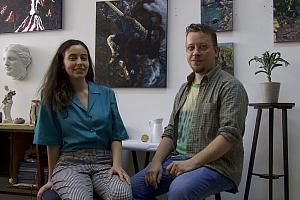From Los Angeles to Cluj: A Romanian actress and filmmaker’s work to change people’s lives for the better
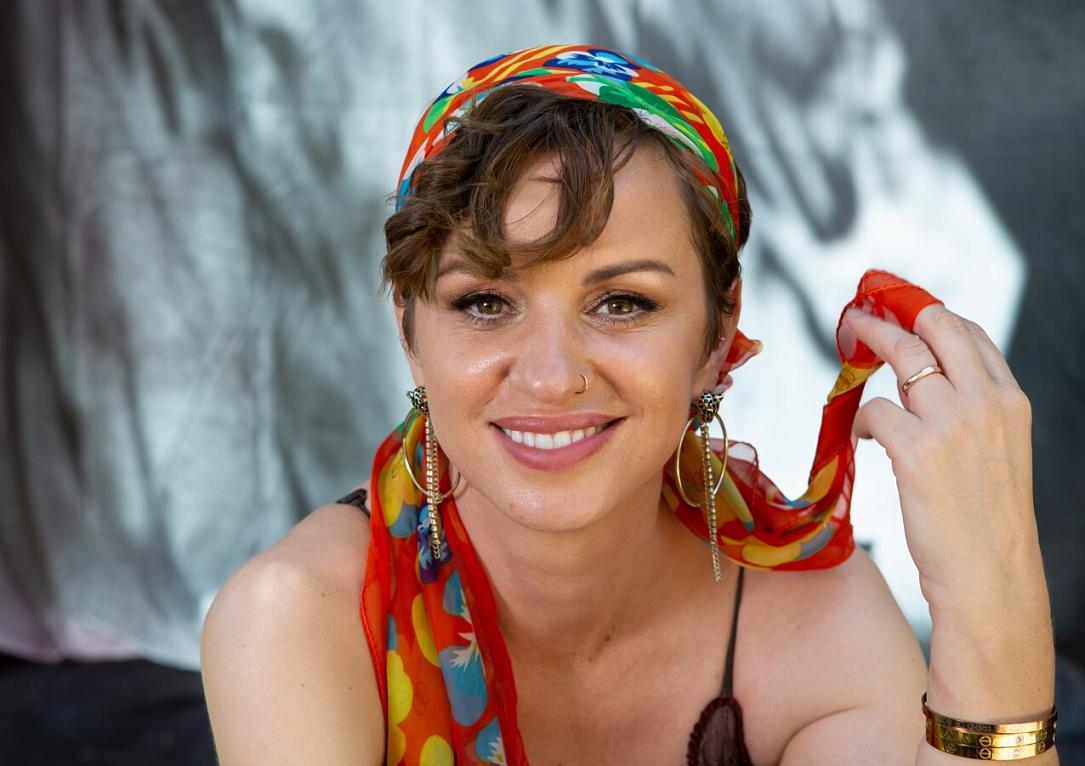
Elena Beucă, a Romanian actress, filmmaker, inspirational speaker, and life coach, and her husband, Dave Rogers, an American actor, filmmaker, and writer, have combined their love of film and storytelling with their passion for helping people. Leaving Los Angeles behind and putting their Hollywood careers on hold, the couple opened the Talita Kumi Foundation, through which they are working on several socially minded projects from their new home in Cluj-Napoca.
Currently, the couple is focusing on the people of Ukraine, whose lives have been forever altered in the wake of the disastrous war. Through projects such as PeaceMates, an initiative that sees Elena and Dave going to the refugee camps at or across the border to share typical American food, as well as ‘food for the soul’ with those affected by the war crisis, and Ukrainian Voices, a documentary film that explores the experiences of the Ukrainian women they met over the summer and gives these brave women a platform where their voices can be heard, Elena and Dave are trying to offer these people a break from the harsh reality they are living and the space to be themselves and regain a sense of normalcy.
Other projects include Elliel, a socially conscious combined fundraising & OTT platform dedicated to the artist community, which features a special mechanism: when you support an artist, part of the proceeds go directly towards helping a non-profit organization; Rise UP with Elena Beucă, a podcast where Elena talks about the process of spiritual growth and shares pieces of wisdom to level up your life and become a braver, kinder, and happier person; and Dear Brother, a documentary film about Elena’s older brother, who was in a coma for four months, and the filmmaker’s personal journey during those months.
I recently had the opportunity of speaking to Elena, who told me all about these projects and opened up about some significant experiences from her personal life as well.
With sparkling hazel eyes and a big smile, Elena is an incredibly warm and sincere person, who wears her heart on her sleeve and seems deeply passionate about doing good.
The Talita Kumi Foundation, the Elliel platform, PeaceMates, your recent films, your podcast – you are doing a lot! I wonder how you juggle everything and what a day in your life looks like.
I wake up. I meditate. I listen. I read. I pray. And then I start my day.
When I meditate, I am at peace. I’m not anxious – my God, I’ve gotta do this! I don’t know how I’m going to do this! And I don’t have the finances for this, or I don’t have the resources. Where am I gonna – blah blah…
When I meditate, I feel so much clearer. And then I just take one thing at a time. Then it’s like Oh, this is the first step. And that leads to the next step. I always say that revelation is progressive. If I am at peace, I know that the next piece of information will be given to me. So, I don’t need to see the whole picture - of the week, the month, the year. I have enough to work with today. And when you trust this process, before you know it you realize you’ve done all these things, and you don’t know how, it just happened.
You have a lot to say on the subject of faith, and it seems to be a big part of your life. Have you always felt so connected to this?
I grew up with it. It’s the only thing I know. Although I grew up, I would say, in a very limited way, because I grew up in a tiny village during communism, where we didn’t have access to a lot of information. It’s very simple, the little information that’s given to you, and one could say narrowminded. Yet, I’m grateful for it, because I’ve realized that simplicity is key. I think we overanalyze and overcomplicate things.
Over the years, I think I’ve always had faith. Have I always been aware of it? Maybe yes, maybe not. There were times in my life when I felt - because I was raised Christian, and because Christians can be judgmental at times - judged and criticized because I knew I was going against their beliefs, but I never felt like I lost my personal faith.
I may have been going against what the Church was saying, but deep down in my heart I always felt connected, that I was still in alignment, and still being guided. I never felt cut off. Even if from the outside it may have looked like I was on the wrongest path ever, I felt that I was still protected in some way.
Do you think following your own path is important? Even if, as you just said, it might look like the “wrongest path” there is?
It’s a way to become free. I don’t know how else to explain it, but you become free of other people’s opinions and expectations, free from being in a box. And unless you mess up, I don’t know how you can actually become free. Maybe there’s a better way, I just don’t know it, cause my way to freedom has been through mistakes. Kid’s mistakes.
You had this idyllic childhood, but one that was also far removed from the outside world. What was that like?
The thing is, growing up in the communist era, we didn’t have TV, we didn’t have a radio. We didn’t know what the world is. It’s hard to comprehend for most people, to understand what that’s like: you live in this tiny village, not knowing what Coca-Cola is basically.
I mean, there were some TVs around, but we did not have one. And what you would see on TV was propaganda anyway and only revolved around little Romania. The rest of the world was unknown.
I grew up in that world, but deep down in my heart, I felt that I didn’t belong. I don’t know how to explain it, but I just knew there was another world out there somewhere. I couldn’t tell you then what that world was like because my daily life was taking care of potatoes, pigs, and sheep, and walking to school and back for an hour each way every day over the hills.
It’s a different world that I am grateful I lived in because I got to experience a different part of history. But I remember, when communism ended, and we started to get a glimpse of the outside world: the existence of America, the fall of the Berlin Wall… A seed was planted within me – the hope that one day I would be a part of it.
You left the village when you were still young. Was your family supportive?
In the countryside, what most of the women had to look forward to was getting married. Get married, have kids, maybe a job. Maybe don’t even have a job, just stay at home and cook and all that stuff. I always felt that if I were to ever do that, that would be the end of me. It sounded like hell. And I knew I had to get out.
When the time came, and I went off to high school, I was the first one in my village to go. And then I went to university, and it felt right. My dad always knew that I don’t feel like I belong, and he supported me and always encouraged me. He never got a formal education, but he’s always been so hungry to learn. He’s read so many books. And he always encouraged me to go out into the world and learn.
How did you end up acting and directing in LA?
I had studied law, thinking that I was going to become a lawyer, and I was working in real estate in Bucharest. But I was unhappy, and I felt trapped. One day, this idea popped into my head, to look for acting schools. I can’t tell you how I thought of it, because I had never been interested in acting up until that point. But all of a sudden, I had the idea to look up acting schools in America, and I found the American Academy of Dramatic Arts and the New York Film Academy. I emailed the American Academy and told them I want to audition, and they gave me the necessary information.
Everything that happened from then on was like a movie. Mr. Florin Zamfirescu gave me three lessons to prepare me for the audition because I didn’t know anything about acting, except that I wanted to do it. When I called him and told him that I want to go to Hollywood, he said ‘Great, you and the rest of the world. What makes you think you’re going to get there?’ And I just said, ‘I’m going to’. He saw my crazy drive, and so he and his wife agreed to train me, told me what books to read, and what monologue to do – I had no idea what a monologue was so I chose a piece of dialogue and acted both parts.
When I auditioned at the Academy, I was the only one that was accepted right away. Normally it takes months to hear from them, but they said they had never seen so much passion and drive in someone. And the truth was, it was just naivete because I didn’t know the rules of Hollywood, so of course, I broke them all. And that’s it.
You end up at the Academy. What was it like there?
I felt so free. To see the level of freedom of the people around me, people doing what they love, with excitement and passion- I felt This is it. I want to be a part of this. It was beyond amazing.
And during this time, you met Dave, your husband?
Yes, at the Ivana Chubbuck Studio. She’s a great coach – she coached Charlize Theron, Brad Pitt, Halle Berry… The Academy teaches you a little bit of everything, but her studio is all about acting, and because I felt so passionate about acting and wanted to learn all I could, even though we were doing eight hours a day at the Academy, I didn’t feel like it was enough. I wanted more. So, someone told me about her studio, and it basically became my church. It was fascinating to be there and to watch people doing their scenes. I think I learned more from watching people’s mistakes than I even did from acting myself. I was there for a couple of years, and I met Dave the very first day when we were both auditioning. We soon became best friends.
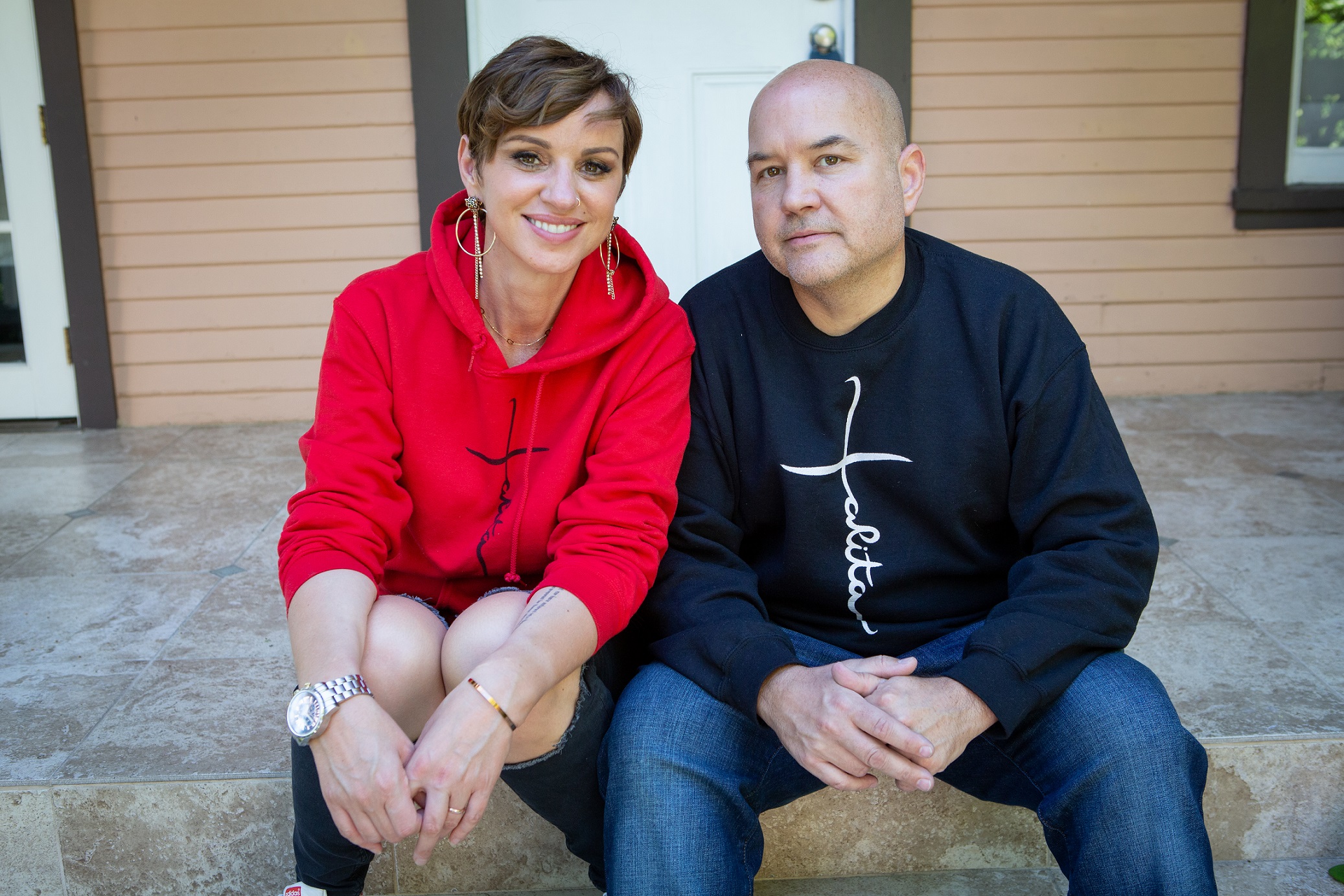
Yes, we were in different classes, but we had such an honesty between us that I would go and watch his class and give him my opinion on his acting, and he would come and judge my acting, and we both grew and learned from each other.
Our passion connected us from the beginning, and because we started that way, we’ve worked together ever since. We’ve done short films, feature films, webisodes, and everything else. The truth is, we almost don’t know how to do it separately. Because we fill so many different roles for each other – producer, writer, actor, caterer, friend, and we’ve always done things together. So, when we are not together, it feels weird. It feels off. It sounds cheesy, but I think we’re soulmates. He adds to mine, I add to his.
You seem to have a special relationship with your family as well. Tell me about your siblings.
Well, I’m the youngest of four. I’m the baby. I have an older sister, Lidia, and two older brothers, Teiu and Nistor. My oldest brother, Teiu, passed away 12 years ago, from cancer. One of the films we made is in his memory. Nistor is the one who had the accident and was in a coma, the one Dear Brother is about.
Elena tells me about her brother passing away. He was 40 years old when he found out that he had cancer. She says the whole family thought that he would survive because he was such a fighter, but in the end, he didn’t get well. She talks about what he was like during his last year and says that he seemed more alive than he had been his entire life.
That year, he lived with such purpose and integrity, and suddenly life became all about helping, giving, and changing other people's lives.
His death really affected me, and since then I kept wondering what he saw in that time before he died because he seemed to understand life in a different way than before.
I am sorry for your loss. These experiences you are describing are so big, the death of a loved one is something that forever changes you. And then your brother Nistor’s situation too… It must have been so frightening.
He got into a serious car accident, and was in the ICU for months, in a coma. The doctors didn’t think he was going to survive, and if he did, they said he would never be the same again, that he would be paralyzed.
All of a sudden, this man who was so strong and had so much charisma and life in him was frozen on an ICU bed, with a bone jutting into his brain.
All of a sudden you had to leave LA, and your career, and come be by his side. What do you remember feeling at the time?
When I came to Romania for my brother, I felt there was a different level that I could never have comprehended before of what it meant to be alive, and what love is. I’ve always loved my family with all my heart, but there by his side, feeding him through a syringe, I felt that I don’t matter anymore.
I’d never felt that before in my life, that level of sacrifice, where you don’t matter anymore and it’s just all about the wellbeing of the other person. At that point, I couldn’t care less about my career or my dreams. It was life and death, life and death. Every day, for days and days. It was all that mattered.
And then, amazingly, he recovered.
Yes, he completely recovered. Another testimony to how awesome God is and how anything is possible.
A different dream bloomed in my heart then. I finally felt like I understood what my brother realized the year before he died. I think he saw then that life is about giving, about blessing others with what you have.
So, you created your foundation. What is Talita Kumi?
What I want Talita Kumi to be is a force for good in the world, where we use media and art to change people’s lives for the better. I want to empower artists to use their creativity in a way that heals people. And any other project that we are working on also comes through the foundation. For instance, Dave and I filmed a documentary about the experiences we had this summer with the Ukrainian refugees.
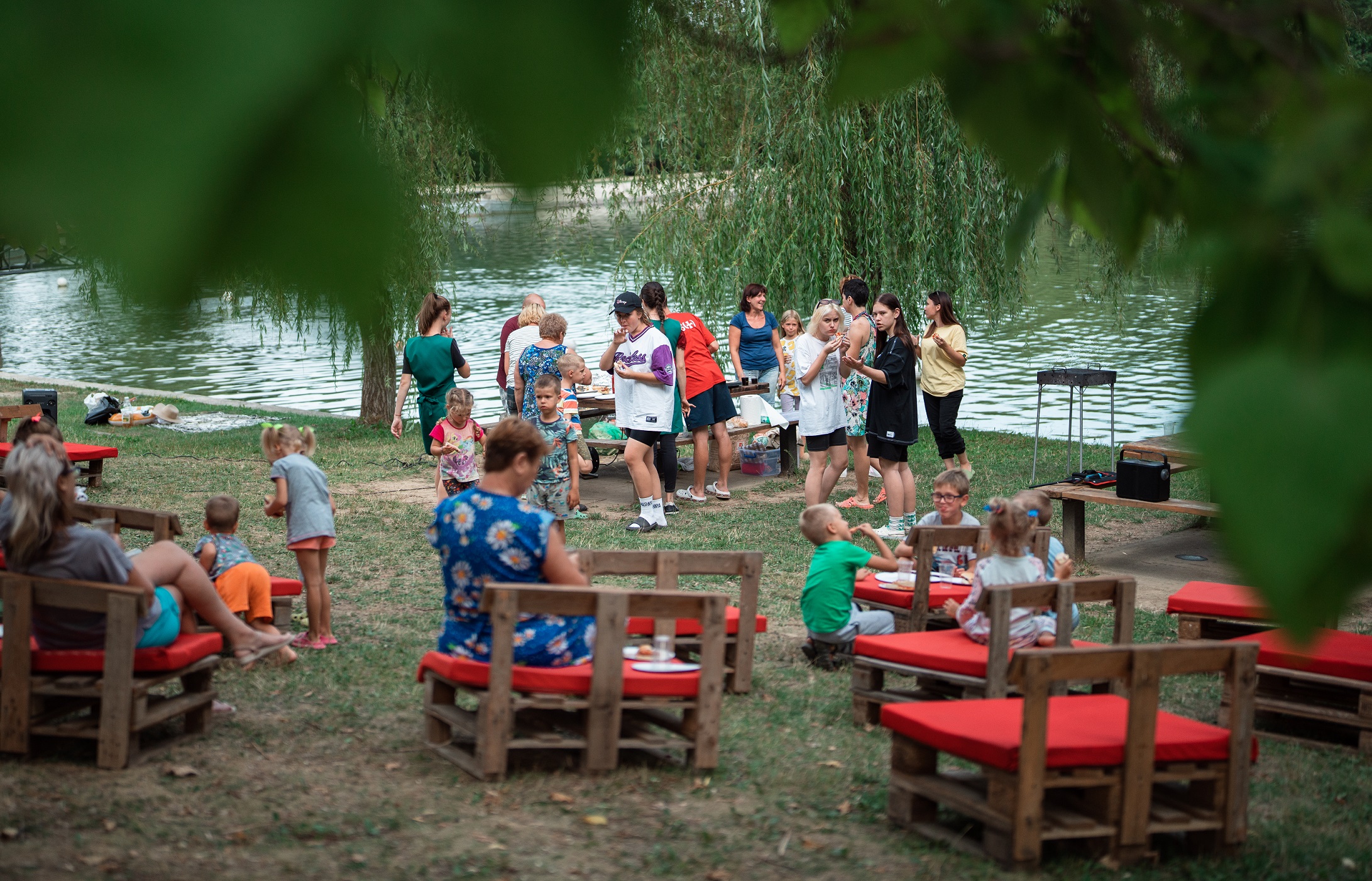
Can you tell me about these experiences and how PeaceMates came about? Which is a great name by the way.
Well, when the war started and the people of Ukraine began to flee their country, we knew we wanted to get involved. It started very simply because Dave was like Man, what can we do to help these people? and we thought Ok, let’s get a food truck. We got the food truck ready, and we had a friend right on the border, at Sighetu’, and he had like 50 refugees coming over, but we realized that if we serve them food from the food truck we lose the connection with the people. Because here’s Dave in a food truck, and there the people are, outside. We wanted the Ukrainians to be a part of it - the whole purpose was for them to feel seen - to talk to people and connect with them. So, we were like, Let’s get a BBQ stand and let’s get a grill started.
It was overwhelming, we didn’t expect it. At first, we didn’t know what to expect because they don’t speak Romanian, and they don’t speak English. Sometimes it was funny because I had a translator who spoke Ukrainian and would translate for me in Romanian, then I would translate for Dave in English.
But we realized that some things don’t really need a translation – it’s just a matter of What can we do? How can we help you? It was overwhelming because we got to hear so many stories of people who are just like Wow, you care. It was just food and stuff, but for them, it felt special because It’s American! They came from America to cook for us, this is crazy! and we’re thinking, it’s no big deal because we would have done it for our friends, you know. And that’s what it felt like, they were our friends. It’s just they were friends that we didn’t know we had.
And just... to hear some of the stories of the women, and of the children who have not seen their parents in 5 or 6 months, and… oh, Lord… so much pain. And yet, for one afternoon they forget about all of it.
Love is the only thing that heals. Love is the only thing in the universe that actually changes things. Man, we didn’t give them much, all we did was cook for them and sing with them. And sometimes we hugged because we couldn’t say a word. And I just – there were kids and women who would just cry in my arms. And there’s nothing I can do other than hug you and cry with you, there’s nothing that I can say but I hope you feel my love.
And that’s the only thing you can hope for, is that this tiny little seed is planted in their hearts, and it will stay and it will sustain them and give them the hope that one day it will all be over.
At first, we called ourselves FoodMates; we were so focused on the food and stuff, but then we thought ‘Why are we doing this? After all, there is one message that I want the world to know and that is that there is nothing more precious than peace and freedom! Nothing.’ It was so painful for me to see that these people don’t have that anymore. It’s been taken away from them for stupid reasons. So, we changed the name to PeaceMates.
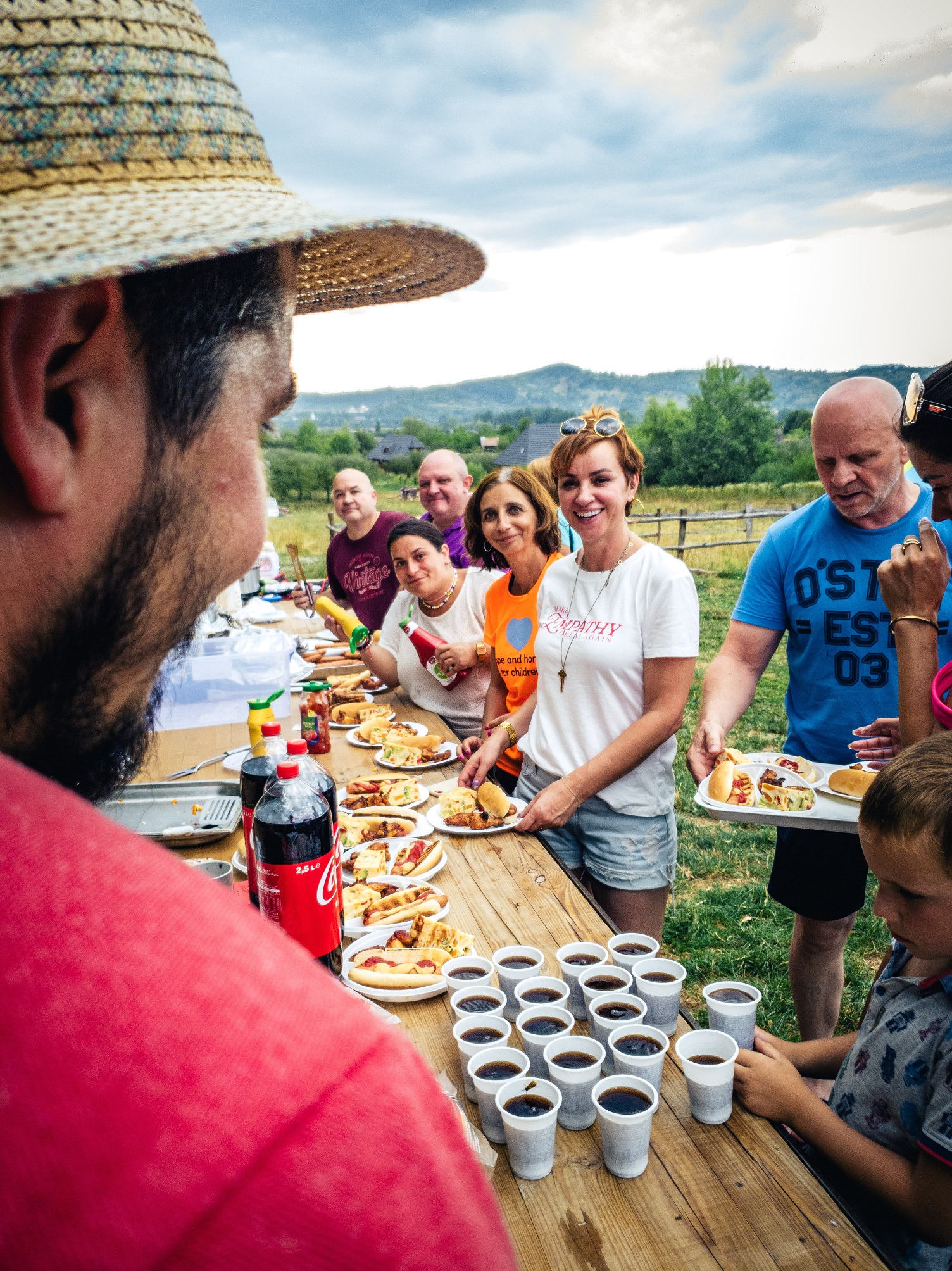
What you did was you created a space where both sides could recognize the humanity in each other and it’s no longer the helper and the helped, it’s two people interacting in their full humanity.
Yes, humans connecting. To see some of the kids helping Dave cook… they don’t speak a word of English, at all, or Romanian, but Dave shows them, you know, through body language, and he says ‘You butter the bread, let me show you,’ and then you do it and they’re so excited. They go back to their parents and their teachers, and they speak in their language and there’s so much joy. By the end of it, we’re not strangers anymore, we’re friends. If we would all understand that with each act of kindness you gain another friend...
There is this deep thing within us, kindness, and I know that it can never be taken away. It might be buried deeply, but it’s still there. And you just have to hope that one little thing can spark the good stuff, you know.
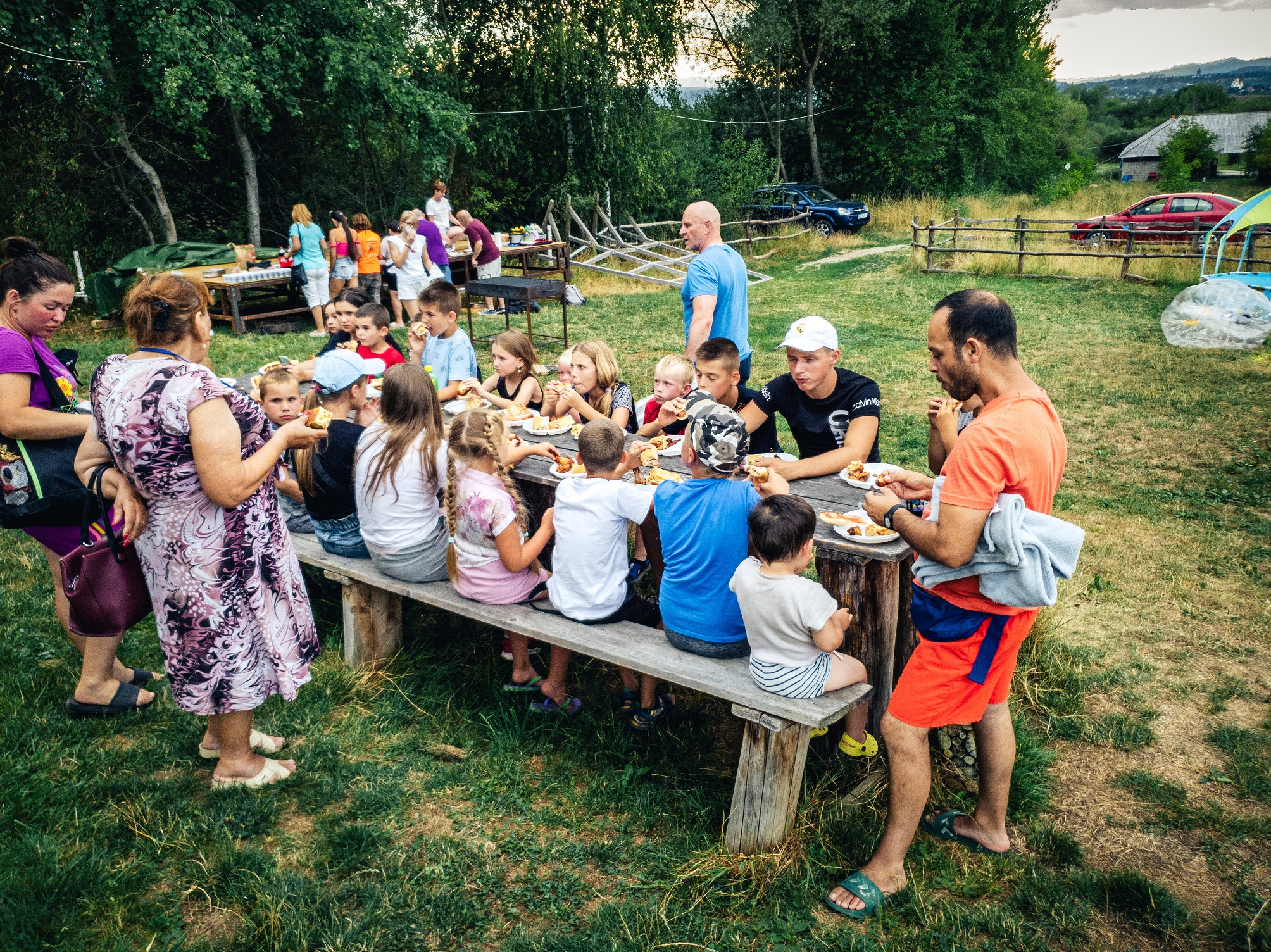
What about the documentary? How did that come about?
My strength lies in filmmaking, so I thought ‘Ok, I’m going to tackle this through a documentary.’ I started the journey thinking that I was documenting their voices, the Ukrainian voices, but I did not know then how much it would seep into our own lives. Without even realizing it, we became part of the film. I can’t tell you too much about it until it’s done, but it was one of the coolest, most crazy experiences that I have ever had, and it taught me so much.
I feel like a very important element that kind of links everything that you do is this idea of touching someone and creating an opportunity for them to find themselves and to find the good within themselves.
I say this – Free people, free people. Hurt people, hurt people. I truly believe that if someone is shown kindness, they will know how to pay it forward. Whether right away or two years from now, it doesn’t matter. One day they will. And I can say that there are more good people than there are evil. I’ve seen bad stuff too, really bad. But if I were to weigh what I saw over the summer, I’d say the good outweighs the bad.
Tell me about the Elliel platform, how was it created, and where you want to take it. Am I right in saying that it’s something akin to Patreon, but with a philanthropic vision?
Yes, kind of. I wanted to create it because I think artists should not have a barrier between them and their audience. Back when we were talking to distribution companies, about selling our film, it was all a lot of blah, blah, blah, really, they were selling us a bunch of fluff. In that situation, they have the power, and you, as an artist don’t have any control at all.
So, I imagined a platform, where an artist can interact directly with their audience. The purpose is to give power to the people and get rid of gatekeepers.
I understand a portion of any money that is given to a creator automatically goes to a non-profit organization or charity – tell me about that.
I think most artists are passionate about something, a cause. And I think a lot of people when they love someone’s art, would feel moved to support whatever charitable cause that artist might care about. I wanted to create a direct link through which, by supporting someone’s art, you’re also doing a good deed.
Building a platform from scratch, it’s a lot of work. But It’s getting there, one step at a time. Hopefully, by the end of the year, it will be ready to be released.
Living in both Romania and the United States, I’m sure you’ve had the chance to see the good and the bad in both places. What are your hopes for each country?
In Romania, I am hoping for a new generation that is brave and authentic and doesn’t hold back to that timid spirit being lorded over them, saying don’t do this, don’t do that. Whether in religion or politics or education or whatever, Romanians have been so brainwashed that they now have this fear to stand up for what they believe in, and they don’t realize that this fear is holding everyone back. They have this fear of looking foolish, so they stay in the box society has placed them in. My hope is that the younger generation is brave, and I am focusing on the young ones because older generations are harder to change, although perhaps they can also. But for the kids, I think there is tremendous hope. They’ve learned about the country’s past, and they’ve seen what’s happening in other countries, so hopefully, they know what not to do.
And in America, more specifically in Hollywood, I would like to see more authenticity. They don’t lack bravery there - it’s a place filled with artists, and artists are without a doubt some of the bravest people I know. There are many brave people in Hollywood. But they compare themselves too much. Instead of working together as a team, they are selfish. That’s what I hope they’ll learn: Authenticity and the power of teamwork. We are all one. America and Romania, and every other country in the world - we are all one. Humanity is one. There is no separation. When we start seeing each other as separate and other, that’s when the problems begin.
Elena, I would like to ask you two very personal questions.
Sure.
The first one is: What is your greatest fear?
My greatest fear is that one day I will get complacent and think that I’ve arrived. We’ve never arrived. I don’t want to arrive. I want to keep going. My dad is 80, and he says 'I know nothing.' He’s so willing to learn more. He has that excitement of finding out what’s around the next bend.
The thing is, you don’t know what’s in you until you’ve been put in uncomfortable situations, situations that really squeeze the juice out of you. Because your mind is so inclined to keep you from experiencing any pain, it does anything and everything it can to keep you away from going into those situations. Don’t go there! We’re fine. We’re fine here. But truly if you want to grow you need to leave your comfort zone.
My favorite book in the world is The Alchemist by Paulo Coelho. It’s so simple, beautiful, and profound. Fear, you know, is such a stupid liar. If you don’t take the leap of faith, you’ll never know. I was in Los Angeles a few weeks ago, I went to see some old places, and I literally felt like I was having an out-of-body experience. I thought Wow, I could have said no to so many things, and never know the life I am living right now, because of fear. I am so happy I took the leap of faith.
That brings us to my second question: When do you feel the happiest?
I am the happiest when I am authentic and fully myself. Now, I am in this moment with you, I am doing my best, and I feel happy. Tomorrow maybe I’ll be ten times better, but right now I am the truest me I can be, and I am doing the best I can do. That makes me happy.
Thank you, Elena. I would like to know - You chose the name Talita Kumi for your foundation. What is the story behind the name?
When I was little, my sister read a book whose title was Talita. And ever since then, I always felt a connection to the name. I felt it was important. It comes from a story from the bible about a miracle that Jesus performed, which goes like this: A 12-year-old girl was sick, and her father asked Jesus to heal her. But by the time he arrived at their house, the girl was dead. So they said, Don’t bother coming in, it’s too late. But Jesus said, Don’t worry about it. She’s just sleeping. Everyone started laughing at him. So, he threw everyone out, except for the girl’s parents. He went to the girl, and, taking her by the hand, said, Talita Kumi - which means Little girl, arise. I always loved that story because to me it showed that all you need to get up and start a new life is a touch of love.
maia@romania-insider.com
(Photos courtesy of Elena Beucă)







